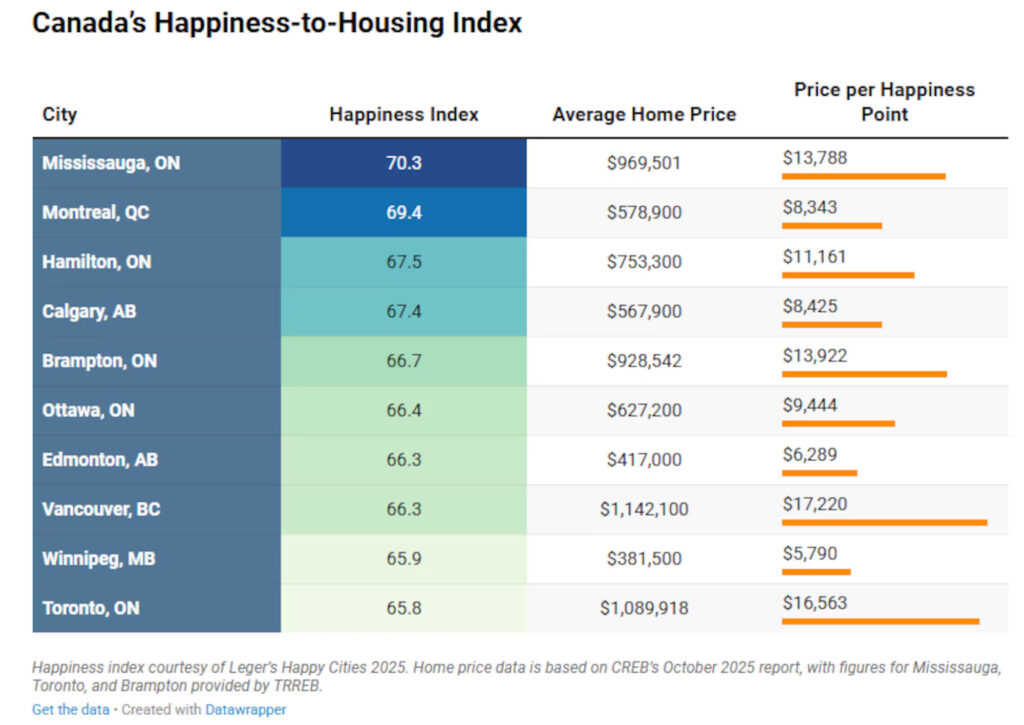In the search for a new life in Canada, most people focus on job markets and real estate prices. But what if the secret to a successful new chapter was simply choosing a city that makes its residents happier?
A new wave of research suggests that affordability and stability—not just high wages—are the true pillars of Canadian well-being.
The recent Leger Happy Cities 2025 Report delivered a surprising verdict: among Canada’s largest urban centres, only two ranked above the national happiness average of 68.7 out of 100. And the happiest of all? It’s not Toronto or Vancouver.
The Key Takeaway: The ‘Price per Happiness Point’
To understand these rankings, real estate experts at Zoocasa analyzed the data using a metric called the “Price per Happiness Point.” This unique number compares a city’s average home price to its happiness score, revealing how much residents are essentially “paying” for each unit of happiness.

Mississauga Leads the Happiness Index in Canada
The biggest surprise from the report is that Mississauga, Ontario, claimed the title of Canada’s happiest major city with a score of 70.3.
Despite its proximity to Toronto’s high costs, Mississauga offers a crucial balance. Its winning formula combines:
Diverse Culture: Known for its strong cultural diversity, which contributes to a feeling of inclusion and belonging.
Economic Opportunity: Located in the thriving Greater Toronto Area (GTA), offering abundant job opportunities, especially in IT, manufacturing, and skilled trades.
Accessibility: Close to major transit and amenities without the extreme traffic and financial pressure of its downtown neighbour.
Mississauga’s Price per Happiness Point is $13,788, a far better value than Toronto’s $16,563. This marginal affordability difference, combined with job availability, is enough to put it over the top.
Montreal: Best Happiness Value for Newcomers
If you are a newcomer seeking the best possible value for your happiness score, look no further than Montreal, Quebec (69.4).
Montreal, and the province of Quebec as a whole, demonstrated remarkable well-being, with Quebec being named the happiest province in Canada (72.4). The reason is overwhelmingly linked to the housing market:
With an average home price of $578,900, Montreal boasts a stunningly low $8,343 Price per Happiness Point. This is a powerful signal for international students and new immigrants: lower housing costs translate directly to less financial stress and higher overall life satisfaction.
Key Insights for International Students & Skilled Newcomers
If you are planning your move or considering where to launch your career in Canada, these happiness scores offer vital direction:
Affordability is Stability: Over 52% of Canadians report that affordable and stable housing is paramount to their quality of life. For newcomers, settling in cities with lower “price per happiness” points (like Montreal or even more affordable markets in the Prairies) can drastically reduce initial stress and improve your mental well-being while studying or starting a career.
The GTA Trade-Off: While Toronto is the largest job market, cities like Mississauga, Hamilton (67.5), and Brampton (66.7) provide access to millions of jobs in IT, engineering, and various in-demand trades without the highest price tag, offering a highly strategic compromise.
Youth Resilience: Canadians aged 18 to 34 are among the most likely to report that their happiness has actually improved over the last year. This trend suggests that young adults, who include many international students and young professionals, are finding ways to adapt and thrive in Canada despite economic challenges.
The National Picture: A Tested but Resilient Population
The Leger report gathered data from over 39,800 Canadians, revealing the general mood of the country:
49% say their happiness has remained stable.
28% saw their happiness decline this year.
23% saw an improvement.
These results indicate that while many Canadians feel “tested” by everyday uncertainty, a significant portion remains resilient, and the data underscores that happiness is now tied less to material wealth and more to fundamental security—chiefly, housing.
Choose Stability, Choose Joy
The 2025 Happy Cities report sends a clear message to everyone moving to Canada: when planning your future, look beyond the biggest names.
Your choice of city should strike a strategic balance between economic opportunity (such as high-demand fields like IT or trades) and financial stability (considering the “price per happiness point”). Mississauga and Montreal have demonstrated that a stable, diverse, and well-supported community is the key to genuine happiness in modern Canada.
By focusing on cities that prioritize this balance, international students and skilled newcomers can maximize their chances not only of succeeding but also of truly thriving and achieving a high quality of life.